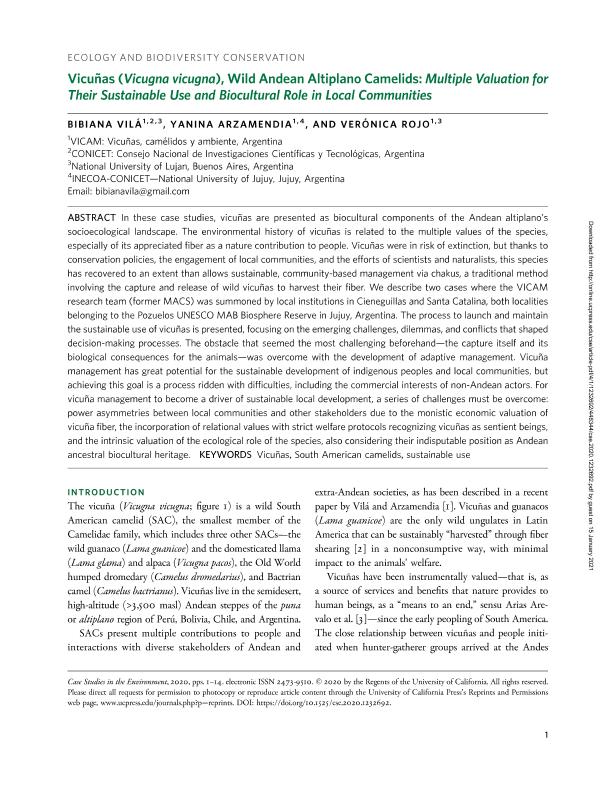Mostrar el registro sencillo del ítem
dc.contributor.author
Vila, Bibiana Leonor

dc.contributor.author
Arzamendia, Yanina

dc.contributor.author
Rojo, Veronica

dc.date.available
2022-05-02T20:11:52Z
dc.date.issued
2021-01
dc.identifier.citation
Vila, Bibiana Leonor; Arzamendia, Yanina; Rojo, Veronica; Vicuñas (Vicugna vicugna), Wild Andean Altiplano Camelids: Multiple Valuation for Their Sustainable Use and Biocultural Role in Local Communities; University of California Press; Case Studies in the Environment; 4; 1; 1-2021; 1-14
dc.identifier.uri
http://hdl.handle.net/11336/156288
dc.description.abstract
In these case studies, vicuñas are presented as biocultural components of the Andean altiplano's socioecological landscape. The environmental history of vicuñas is related to the multiple values of the species, especially of its appreciated fiber as a nature contribution to people. Vicuñas were in risk of extinction, but thanks to conservation policies, the engagement of local communities, and the efforts of scientists and naturalists, this species has recovered to an extent than allows sustainable, community-based management via chakus, a traditional method involving the capture and release of wild vicuñas to harvest their fiber. We describe two cases where the VICAM research team (former MACS) was summoned by local institutions in Cieneguillas and Santa Catalina, both localities belonging to the Pozuelos UNESCO MAB Biosphere Reserve in Jujuy, Argentina. The process to launch and maintain the sustainable use of vicuñas is presented, focusing on the emerging challenges, dilemmas, and conflicts that shaped decision-making processes. The obstacle that seemed the most challenging beforehand? the capture itself and its biological consequences for the animals? was overcome with the development of adaptive management. Vicuña management has great potential for the sustainable development of indigenous peoples and local communities, but achieving this goal is a process ridden with difficulties, including the commercial interests of non-Andean actors. For vicuña management to become a driver of sustainable local development, a series of challenges must be overcome: power asymmetries between local communities and other stakeholders due to the monistic economic valuation of vicuña fiber, the incorporation of relational values with strict welfare protocols recognizing vicuñas as sentient beings, and the intrinsic valuation of the ecological role of the species, also considering their indisputable position as Andean ancestral biocultural heritage.
dc.format
application/pdf
dc.language.iso
eng
dc.publisher
University of California Press
dc.rights
info:eu-repo/semantics/openAccess
dc.rights.uri
https://creativecommons.org/licenses/by-nc-sa/2.5/ar/
dc.subject
VICUÑAS
dc.subject
SOUTH AMERICAN CAMELIDS
dc.subject
SUSTAINABLE USE
dc.subject.classification
Conservación de la Biodiversidad

dc.subject.classification
Ciencias Biológicas

dc.subject.classification
CIENCIAS NATURALES Y EXACTAS

dc.title
Vicuñas (Vicugna vicugna), Wild Andean Altiplano Camelids: Multiple Valuation for Their Sustainable Use and Biocultural Role in Local Communities
dc.type
info:eu-repo/semantics/article
dc.type
info:ar-repo/semantics/artículo
dc.type
info:eu-repo/semantics/publishedVersion
dc.date.updated
2022-01-27T18:16:05Z
dc.identifier.eissn
2473-9510
dc.journal.volume
4
dc.journal.number
1
dc.journal.pagination
1-14
dc.journal.pais
Estados Unidos

dc.journal.ciudad
California
dc.description.fil
Fil: Vila, Bibiana Leonor. Consejo Nacional de Investigaciones Científicas y Técnicas; Argentina. Universidad Nacional de Luján. Departamento de Ciencias Sociales; Argentina
dc.description.fil
Fil: Arzamendia, Yanina. Universidad Nacional de Jujuy. Instituto de Ecorregiones Andinas. Consejo Nacional de Investigaciones Científicas y Técnicas. Centro Científico Tecnológico Conicet - Salta. Instituto de Ecorregiones Andinas; Argentina
dc.description.fil
Fil: Rojo, Veronica. Universidad Nacional de Jujuy. Instituto de Ecorregiones Andinas. Consejo Nacional de Investigaciones Científicas y Técnicas. Centro Científico Tecnológico Conicet - Salta. Instituto de Ecorregiones Andinas; Argentina
dc.journal.title
Case Studies in the Environment
dc.relation.alternativeid
info:eu-repo/semantics/altIdentifier/doi/http://dx.doi.org/10.1525/cse.2020.1232692
dc.relation.alternativeid
info:eu-repo/semantics/altIdentifier/url/https://online.ucpress.edu/cse/article/doi/10.1525/cse.2020.1232692/115532/Vicunas-Vicugna-vicugna-Wild-Andean-Altiplano
Archivos asociados
